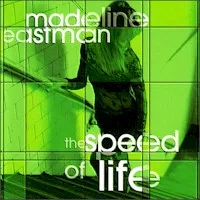Bitrate: MP3@320K/s
Time: 60:44
Size: 139.1 MB
Styles: Jazz vocals
Year: 2003
Art: Front
[6:02] 1. Alone Together
[5:25] 2. Someday We'll All Be Free
[3:58] 3. Do I Hear A Waltz
[4:20] 4. Up On The Roof
[3:52] 5. There's A Small Hotel
[4:41] 6. We Kiss In A Shadow
[4:35] 7. Dancing On The Ceiling
[5:00] 8. Wait Till You See Her
[4:11] 9. If I Should Lose You
[7:38] 10. Get Happy
[4:51] 11. Jogral
[6:06] 12. Where Or When
Madeline Eastman - Vocals; Bass – Rufus Reid; Drums – Akira Tana; Percussion – Michael Spiro; Piano – Randy Porter; Trumpet – Mike Olmos.
Have you ever been in a club, or sat listening to a live recording, when a tenor saxophonist blows a solo in the middle of a standard, and it stays pretty much faithful to the theme for a bit, then stretches out into some unexpected – beautifully so – variations of theme, while still hanging onto it? A small, gorgeous musical surprise that makes someone in the audience moan: "Oh!" And a beat latter he sighs: "yeah..."
I found myself doing this with Madeline Eastman's The Speed of Life, at least a couple of times per tune. While a tenor player does it with notes, Madeline Eastman does it with syllables strung together into distinctive phrases. No tenor here; it's the vocalist who's eliciting these responses, with a distinctive and personal style of phrasing and intonation on a set of mostly standards – and, wisely, not the ones you hear every day. I'm a believer – to an extent – of first impressions, and Eastman's disc, on an intitial listen, made me me think of Sinatra, not because she's covering a few of the songs that Old Blue Eyes preferred. Or because she sounds like him. She doesn't. But man, has she developed a personal and very engaging style of phrasing a lyric, matched with a delivery that is seemingly effortless. A palpable self-confidence, a Sinatra-esue aplomb. I doubt she wears a fedora tilted at a rakish angle, but that's the attitude that comes across. Sometimes she whispers, or purrs, or chats confidentially, and sometimes she just belts it out. Forthrightness – another Sinatra attribute – seems to be her stock in trade.
The Speed of Life showcases Eastman's vocal talent in front of a superb quartet (and sometimes quintet, with an additional percussionist) anchored by bassist Rufus Reid's big, round, assertive sound. He seems a perfect and stolid musical soulmate for Eastman. Pianist Randy Porter uses a less-is-more approach, leaving astutely placed silences for Eastman to fill. Eastman has developed quite an original sound with a great vocal range. Mix up Carmen McRae's chops (and a touch of Carmen's attitude) and some Billie Holiday with a dash or two of Ella (though her scatting is not Ella-like at all). Six of the twelve selections on the disc are Richard Rogers tunes, including an almost hip-hop version of "Do I Hear a Waltz" which features Reid's rubbery bass lines puntuated by Akira Tana's snappy rat-ta-tat drums, sliced through with Mike Olmos' muted trumpet work – showing those hip-hop guys how it should be done. The rather subtle Rodgers/Hammerstein gem "We Kiss in a Shadow" starts out a wistful and clandestine mood that gradually swells to a bold proclamation of forbidden love. It's a crowded field, but this is one of the finest lady vocalist discs of the year. ~Dan McClenaghan
The Speed Of Life









